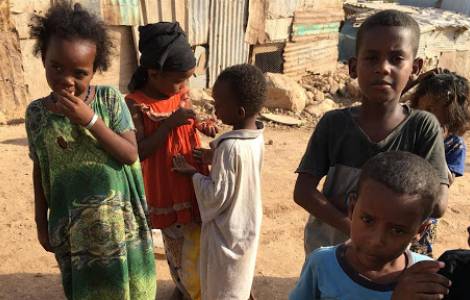
Djibouti (Agenzia Fides) - Covid-19, the devastating floods in some areas of Hirshebelle, Southwest, Jubbaland and Puntland, and a new plague of locusts were the three factors that triggered the crisis and aggravated the main pillars of the Somali economy in recent months. In response to the pandemic, Caritas Somalia has intervened in Mogadishu, Garowe and Bosaso with information programs, through local Puntland television, and with the distribution of prevention materials in the three areas. In Djibouti, the official data released by the local Ministry of Health on the spread of Coronavirus reported, as of February 21, 2021, 6 024 positive cases, 5 873 recoveries and 63 deaths, mostly of patients over 70 already hospitalized with very serious pathologies in progress. "We can say that from a health point of view, the pandemic is developing very slowly, thanks also to the timely interventions of the authorities", wrote to Agenzia Fides Sara Ben Rached, volunteer and head of Caritas Somalia and operator of Caritas Djibuti together with Msgr. Giorgio Bertin bishop of Djibuti and Apostolic Administrator of Somalia. "According to ministerial statements in this area, the virus seems less aggressive and does not produce devastating symptoms as in Europe, and even, in many cases, patients, even if they test positive, are completely asymptomatic. At the same time - she explains - society seems to have divided into two factions, on the one hand the richest and most educated people who respect the precautionary measures imposed by the Government, on the other the largest group of communities who tend not to respect preventive measures, especially due to the complicity of numerous families who believe little or nothing in the existence of a global pandemic emergency".
Sara continues to explain: "the government authorities, from 23 March 2020, until 17 May 2020 had put the entire city in lockdown, immediately blocking activities of worship, the movement of people by air, land and sea, suspending educational activities of all order and degree, closing all commercial activities with the exception of those essential such as food, pharmacies and restaurants (only take away). In addition, from the first months an information campaign was carried out for the prevention of contagion, through posters, television messages and on the main social networks and even an audio message in different languages at the beginning of each phone call" . The State had also organized a massive campaign to distribute basic aid to those most in need. In collaboration with the Ministry of Women and the Family and with the European Union, Caritas Djibuti has carried out a project for the protection of 80 children between the ages of 6 and 18, usually street children (see Fides, 27/1/2021) , who stayed at the Caritas facility throughout the quarantine period. "We carried out recreational activities with the children without ever letting them leave the facility, guaranteeing them food, medical care and qualified assistance both day and night - writes the volunteer. This project involved enormous efforts due to the restless nature of the children, amplified after the floods of late April 2020 that flooded the project headquarters. However, the charity of the people has been and is remarkable. We can count on the help of many private citizens, Italian, German, Spanish and French soldiers, always ready to lend a hand with donations of food and goods or direct aid".
Sara emphasizes that, as in other parts of the world, Djibouti is also increasingly rediscovering and strengthening the concept of mutual solidarity, regardless of real economic capabilities. "From a social point of view, this emergency prompts us to rediscover basic human values, to strengthen interpersonal relationships and reduce the frenzy of modern life". The state of Djibouti, with 113,700 tests carried out, is at the top of the continental ranking for the number of tests per million inhabitants.
In November 2020, following cyclone Gati which hit 120,000 people in the semi-autonomous region of Puntland, Caritas Somalia intervened in Bosaso and Alula with the distribution of food, blankets and tents. (SER/AP) (Agenzia Fides, 26/2/2021)